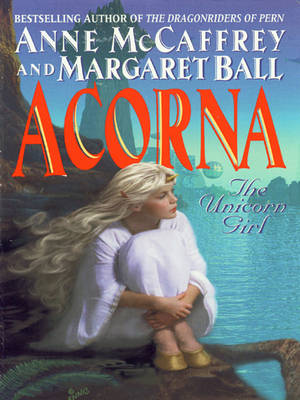Reviewed by Kate (Blogging with Dragons) on
I was dismayed that this book was not really focused on Acorna at all. Instead, it was a story about the three miners that found the little unicorn girl and took care of her. Of course, many people were fascinated by Acorna and wanted her for experiments or other dark purposes. So the miners were forced to whisk her away to new planets to keep her safe. While this may sound exciting, it really wasn’t. There was no sense of urgency or growing danger at all—even when they relocated to the most dangerous planet in the galaxy. Any people that threatened Acorna or her companions were magically and easily dealt with.
What’s more, none of the miners seemed very upset that they had to give up their lives and careers in order to take care of their new ward. Acorna too, felt no guilt at the changes she had wrought on her caretakers’ lives. When Acorna magically aged over night into a stunning young woman, she still remained unconcerned about things that should have been important—who she was and where she came from, what happened to her race of people—and to my horror, she instead focused on the child labor on the planet. And suddenly, I found that I was reading a book about a female activist who was determined to free all the enslaved and abused children on the planet.
Needless to say, this was not at all what I expected. Sure, Acorna sometimes used her horn to heal the wounds of these poor children, but that was about as magical as the book got. Though the children revered her as the goddess Epona, I however, felt no attachment to Acorna or any of the other flat characters. I simply didn’t care if Acorna and her companions ran into any trouble, because I knew they’d easily find a solution. Any parts of the story that had interested me were either glossed over or ignored.
Ultimately, this book had enormous potential and such an original idea, but fell so unbelievably short . I was really disappointed to find a book that wasn’t about a unicorn girl who struggled to overcome prejudices, danger, and other adversity to find her place in society. What McCaffrey and Ball gave me was a bland young woman, who felt very little fear or curiosity at her differences and was immediately loved by everyone who met her. As such, Acorna and its characters were completely uncompelling and I will not be reading the next books in the series.
Reading updates
- Started reading
- 13 July, 2014: Finished reading
- 13 July, 2014: Reviewed

